
Monday, August 31, 2009
Sunday, August 30, 2009
Bougainville's Coconut Revolution
This is just a preview. The full documentary can be viewed at http://video.google.com/videoplay?docid=-1192286025577999101.
This is a documentary about the fight of the people of Bougainville against New Guinea and imperialistic mining corporations that only want to exploit Bougainville and its people leaving the environment of the island totally devastated. This is the modern-day story of a native peoples' remarkable victory over Western Colonial power. A Pacific island rose up in arms against giant mining corporation Rio Tinto Zinc (RTZ) - and won despite a military occupation and blockade. When RTZ decided to step up production at the Panguna Mine on the island of Bougainville, they got more than they bargained for. The island's people had enough of seeing their environment ruined and being treated as pawns by RTZ. RTZ refused to compensate them, so the people decided it was time to put an end to outside interference in the island's affairs. To do this they forcibly closed down the mine. The Papua New Guinea Army (PNGDF) were mobilised in an attempt to put down the rebellion. The newly formed Bougainville Revolutionary Army (BRA) began the fight with bows & arrows, and sticks & stones. Against a heavily armed adversary they still managed to retain control of most of their island. Realising they were beaten on the ground, the PNGDF imposed a gunboat blockade around Bougainville, in an attempt to strangle the BRA into submission. But the blockade seemed to of had little or no effect. With no shipments getting in or out of the island, how did new electricity networks spring up in BRA held territory? How were BRA troops able to drive around the island without any source of petrol or diesel? What was happening within the blockade was an environmental and spiritual revolution. The ruins of the old Panguna mine where being recycled to supply the raw materials for the world's first eco-revolution.
And here is an ABC interview just days after the sudden death of Bougainville's President Joseph Kabui in June 2008: [click here].

Saturday, August 29, 2009
Whetting my appetite
 icon for full screen
icon for full screenIt's still some time before I set out on my next tropical adventure but pleasures are always greatest in anticipation, aren't they?
This time I'll cross the Wallace Line as I hope to travel from Bali to nearby Lombok and the tiny Gilis, and then on to Komodo and Flores. Nothing is booked and nothing is planned - except for my first night in Bali with my old friends at HARRIS Tuban - as I want to take each day as it comes and live entirely in the moment. However, I may have to prebook the 5-day PERAMA-cruise as I am getting a bit long in the tooth for deck passage and would prefer a cabin to myself.
and those who do not travel read only one page.” St. Augustine "N'oublie pas d'etre heureuse" (Do not forget to be happy) |

Thursday, August 27, 2009
Walk Into Paradise
 Walk Into Paradise is a fascinating film, perhaps more for its choice of location than its dramatic qualities. The location, of course, is the Australian-administered territories of Papua and New Guinea (before the country gained independence) where I spent many happy years of my life. The film indulges in some pro-colonial romanticism, in which Chips Rafferty shoulders the white man’s burden to bring civilisation to the savage heart of New Guinea which, says the introductory narration, is an island where 'today a gallant band of young Australian administrators are bringing civilisation to the most primitive people left on the face of the earth’.
Walk Into Paradise is a fascinating film, perhaps more for its choice of location than its dramatic qualities. The location, of course, is the Australian-administered territories of Papua and New Guinea (before the country gained independence) where I spent many happy years of my life. The film indulges in some pro-colonial romanticism, in which Chips Rafferty shoulders the white man’s burden to bring civilisation to the savage heart of New Guinea which, says the introductory narration, is an island where 'today a gallant band of young Australian administrators are bringing civilisation to the most primitive people left on the face of the earth’.
The film was shot on location in several inhospitable locations, and it has some remarkable footage to show for it: Sepik River long canoes paddled exclusively by women, and a full-scale highlands sing-sing, with hundreds of warriors in traditional dress trampling down grass to make an airstrip. Much of the story mirrors incidents in the pioneering expeditions of the Leahy brothers, the first white men to reach the New Guinea highlands, in the early 1930s.
The DVD is sold by the Papua New Guinea Association of Australia.

Tuesday, August 25, 2009
Hello from the Daintree River
 Just when we thought him lost, our old globe-trotting friend Rob Krenn sends us an email from the Daintree River in Far North Queensland where he is on tour with a group from Germany.
Just when we thought him lost, our old globe-trotting friend Rob Krenn sends us an email from the Daintree River in Far North Queensland where he is on tour with a group from Germany.
He found time to email because the bus broke down and they missed the scheduled trip to the Great Barrier Reef.
They'll be back in Cairns tomorrow when Rob will fly to Darwin to meet the next group. Rob writes that one of his tour-members, an elderly gentleman, hasn't washed for a whole three weeks which causes a few raised eyebrows, not to mention noses, amongst the other passengers.
We met Rob more than six years ago - see "Dear All" letter - when he introduced us to little Rover.

Monday, August 24, 2009
That was the week, that was!
 A Newcastle man who won a $2 million Lotto prize avoided claiming his winnings for seven months while he prepared himself mentally. The 48-year-old small businessman discovered his win on January 13, the morning after the draw, but has been storing the ticket in a tin since then. He contacted NSW Lotteries this Thursday to collect the win. "I'm a bit of a crazy sort of bloke," he told John Vineburg from NSW Lotteries. How true!
A Newcastle man who won a $2 million Lotto prize avoided claiming his winnings for seven months while he prepared himself mentally. The 48-year-old small businessman discovered his win on January 13, the morning after the draw, but has been storing the ticket in a tin since then. He contacted NSW Lotteries this Thursday to collect the win. "I'm a bit of a crazy sort of bloke," he told John Vineburg from NSW Lotteries. How true!The Happy Little Vegemites jingle had to wait even longer before being added to The Sounds of Australia registry which preserves famous sounds with historical or social significance. What could be socially more significant than Vegemite? Aeroplane Jelly perhaps?
Not that Vegemite is an Australian company any longer. It was bought out by foreigners a long time ago who probably anticipated what Dun & Bradstreet have just confirmed: that Australia is one of the four most secure countries to invest in, together with Canada, Norway, and Switzerland.
But not necessarily the most secure when it comes to visiting a public toilet as a 70-year-old Cairns man has just found out who became stuck at the Cairns Central Shopping Centre toilets after someone had smeared super-glue over the toilet seat. He was taken to the Cairns Base Hospital, where the toilet seat was removed. Outch!!!

Friday, August 21, 2009
Our social colander
22 August Saturday Moruya Markets
23 August Sunday Country & Western
28 August Friday Nelligen Community Dinner
30 August Sunday Nelligen Church
12 September Saturday Hat & Handbag Parade

Wednesday, August 19, 2009
Hermann Hesse and the joys of literature
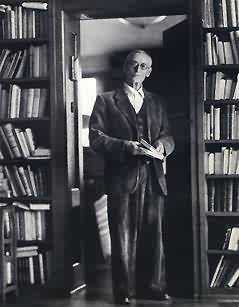 The most fundamental delight which literature can offer has something to do with the perception or discovery of truth, not necessarily a profound or complex or earthshaking truth, but a particular truth of some order. This "epiphany" comes at the moment of recognition when the reader's experience is reflected back at him.
The most fundamental delight which literature can offer has something to do with the perception or discovery of truth, not necessarily a profound or complex or earthshaking truth, but a particular truth of some order. This "epiphany" comes at the moment of recognition when the reader's experience is reflected back at him.
This is what happened to me when idly, and to pass the time on a grey day, I picked up "Wandering: Notes and Sketches" (German title: "Wanderung: Aufzeichnungen") by Hermann Hesse and suddenly found myself totally absorbed in what the backcover had described as 'a fine antidote to the anxiety-provoking pressures of today.' Let the following excerpts speak for themselves:
| Like the day between morning and evening, my life falls between my urge to travel and my homesickness. Maybe some day I will have come far enough for travel and distances to become part of my soul, so that I will have their images within me, without having to make them literally real any more. ["Red House"] Many of my desires in life have been fulfilled. And every fulfillment quickly became satiety. But to be satisfied was the very thing I could not bear. No goal that I reached was a goal, every path was a detour, every rest gave birth to new longing. Many detours I will still follow, many fulfillments will still disillusion me. One day, everything will reveal its meaning. When we are stricken and cannot bear our lives any longer, then a tree has something to say to us: Be still! Be still! Look at me! Life is not easy, life is not difficult. Those are childish thoughts. Let God speak within you, and your thoughts will grow silent. You are anxious because your path leads away from mother and home. But every step and every day lead you back again to the mother. Home is neither here nor there. Home is within you, or home is nowhere at all. From time to time there rises in my soul, without external cause, the dark wave. A shadow runs over the world, like the shadow of a cloud. Joy sounds false, and music stale. Depression pervades everything, dying is better than living. Like an attack this melancholy comes from time to time, I don't know at what intervals, and slowly covers my sky with clouds. It begins with an unrest in the heart, with a premonition of anxiety, probably with my dreams at night. People, houses, colours, sounds that otherwise please me become dubious and seem false. Music gives me a headache. All my mail becomes upsetting and contains hidden arrows. At such times, having to converse with people is torture, and immediately leads to scenes. Because of times like this, one does not own guns; for the same reason, one misses them. Anger, suffering, and complaints are directed at everything, at people, at animals, at the weather, at God, at the paper in the book one is reading, at the material of the very clothing one has on. But anger, impatience, complaints, and hatred have no effect on things, and are deflected from everything, back to myself. I am the one who deserves hatred. I am the one who brings discord and hatred into the world. I am resting after such a day. I know that for a while now rest is to be expected. I know how beautiful the world is; for the time being, it is more beautiful for me than for any other person; colours fuse more delicately, the air flows more blisfully, the light hovers more tenderly. And I know that I must pay for this with the days when life is unbearable. There are good remedies against depression: song, piety, the drinking of wine, making music, writing poems, wandering. By these remedies I live, as the hermit lives by his prayers. Sometimes it seems to me that the scales have tipped, and that my good hours are too seldom and too few to make up for the bad ones. Then sometimes I find that, on the contrary, I have made progress, that the good hours have increased and evil ones decreased. What I never wish, not even in the worst hours, is a middling ground between good and bad, a lukewarm, bearable centre. No, rather an exaggeration of the curve - a worse torment and, because of it, the blessed moments even richer in their brilliance. |

Tuesday, August 18, 2009
Monday, August 17, 2009
Calling Victor Aung, Burmese Marine Biologist
 Putting something on the internet is like launching a message in a bottle as one never knows where it may end up. I hope this one ends up with someone who knows the whereabouts of Victor Aung whom I met while living on Thursday Island in 1977. Victor, who is from Burma, worked on an oyster farm on nearby Friday Island implanting nuclei into the shells to produce cultured pearls. Being young and single, he had got tired of his monotonous work in an isloated location and left the Torres Strait soon afterwards. The last time I heard from him, he was sorting mail at the GPO in Sydney!
Putting something on the internet is like launching a message in a bottle as one never knows where it may end up. I hope this one ends up with someone who knows the whereabouts of Victor Aung whom I met while living on Thursday Island in 1977. Victor, who is from Burma, worked on an oyster farm on nearby Friday Island implanting nuclei into the shells to produce cultured pearls. Being young and single, he had got tired of his monotonous work in an isloated location and left the Torres Strait soon afterwards. The last time I heard from him, he was sorting mail at the GPO in Sydney!
 I was reminded of all this when I read Eric Hansen's story "Life at the Grand Hotel" in which he describes his meeting with Kazuyoshi Takami, the owner of the cultured pearl farm on Friday Island. Kazuyoshi was brought up in Japan, but at the time of Eric's visit in 1992 he had already lived on the island for eighteen years. Once a month he flew down to Cairns to visit his wife and two children. The rest of the time he worked on the oyster farm, tending the 10,000 oysters placed in wire baskets and suspended from oil-drum rafts for the two or three years it takes to make a cultured pearl.
I was reminded of all this when I read Eric Hansen's story "Life at the Grand Hotel" in which he describes his meeting with Kazuyoshi Takami, the owner of the cultured pearl farm on Friday Island. Kazuyoshi was brought up in Japan, but at the time of Eric's visit in 1992 he had already lived on the island for eighteen years. Once a month he flew down to Cairns to visit his wife and two children. The rest of the time he worked on the oyster farm, tending the 10,000 oysters placed in wire baskets and suspended from oil-drum rafts for the two or three years it takes to make a cultured pearl.
I've contacted Kazuyoshi on Friday Island to find out if he knows where Victor is now.
Victor, if you read this and remember Peter and Daw Khin San Myint on Thursday Island, please contact me.
If anybody else knows Victor's whereabouts, please email me at riverbendnelligen[AT]mail.com

Sunday, August 16, 2009
Books I have on order




Eric Hansen's book are very readable and entertaining travelogues. Of course, I could've written my own book about trading mistakes but it'll be good to read about them from others for a change. "Super Trader" is just wishful thinking while "Never Cry Wolf" will prepare me for the eventual viewing of the movie. "Off the Road" is a modern-day Chaucer's tale of Europe's oldest form of packaged tour, the pilgrimage to Santiago de Compostela in Spain. "The Philosopher and the Wolf" is a great nature story while offering, as it sub-title 'Lessons From the Wild on Love, Death And Happiness' suggests, profound philosophical insights. Finally, "Who Ordered This Truckload of Dung?" is not a reflection on the books I've ordered but a title which Padma requested.
Saturday, August 15, 2009
That was the week, that was!
 Remember when a Leo Gao in New Zealand ask for a $10,000 bank overdraft and was given $10 million? Good ol' Leo and his partner Kara promptly drew out the money and left New Zealand for destinations unknown. Now Westpac says the female employee who gave away that first million has been fired after making a similar mistake on a different customer's account. "You can bank on the WALES" (but that's perhaps before your time)
Remember when a Leo Gao in New Zealand ask for a $10,000 bank overdraft and was given $10 million? Good ol' Leo and his partner Kara promptly drew out the money and left New Zealand for destinations unknown. Now Westpac says the female employee who gave away that first million has been fired after making a similar mistake on a different customer's account. "You can bank on the WALES" (but that's perhaps before your time)And spare a thought for the poor Saudi princess who had jewels and cash worth 11 million euros ($18.7 million) stolen from her hotel room in Sardinia. In 10 minutes at dinner time, without making any noise, the thieves managed to remove the safe which was only fixed with silicon to the wall.
This next one is completely silicon-free: the 34DD-sized Romanian tennis star, Simona Halep, has booked herself into a private hospital for breast reduction surgery. When asked about the decision, Simona stated the following: "This fall I'll have a breast reduction operation. The breasts make me uncomfortable when I play. It's the weight that troubles me - my ability to react quickly." While Simona believes that the reduction will give her less weight to carry around, the loss of her large boob size will also result in the loss of many fans. Let me be the first to shed a tear during this sad moment in the world of sports.
No tears will be shed over another big thing, the Big Prawn at Ballina. The Ballina Shire Council has received a submission seeking permission to demolish the Big Prawn. The Ballina mayor, Phillip Silver, says it is hard to say if the aging fibreglass structure is an icon or an eyesore. He says while some would be sad to see it go, he has already heard suggestions that it should be replaced by a big pelican.
With all that graft going on in Australian politics, one has to wonder if the City of Greater Geelong has got it right when it sacked two workers who accepted free steak sandwiches. The two men, Mick Van Beek and Peter Anderson, lost their jobs two weeks ago after doing a favour for a sporting club by filling several potholes in their car park. When they returned to the club a week later to buy lunch, the manager told them their steak sandwiches were on the house. They ought to have ask for a few hundred thousand dollars which would've raised no eyebrows at all!
In the meantime, another public "servant" isn't just accepting free sandwiches but a $1.95 million pay cheque for doing nothing at all! That's what Mike Quigley is being paid each year to run the company that will one day build the Government's $43 billion National Broadband Network. The Opposition's communications spokesman, Nick Minchin, says he is astounded at Mr Quigley's salary, given that the broadband network is no certainty. "[He gets] nearly six times what the Prime Minister gets paid, to head up what is nothing more than a facade," he said. "This is just a Government entity which has no employees, no actual business; doesn't buy or sell any goods or services to anybody. I think Australians would be staggered. "It could be run by public servants frankly, because there is nothing for them to do yet - we have a chairman on nearly $2 million a year, we have five directors on nearly $90,000 a year each," he continued. Good ol' Nick confirms what we've known for years: when it comes to doing nothing, you call in the experts: the public servants!
While talking of getting money for nothing, a Sydney Post Office licensee has been arrested and charged after allegedly committing Australia's biggest ever postal fraud worth more than $4.2 million. It is alleged the 43-year-old man was defrauding Australia Post in relation to monies paid to him for sales of postage stamps. That's a lot of stamps!
Maybe he had a drinking problem? A lot of Russians have which is why Russian President Dmitry Medvedev has called time on the country's vodka tipplers, saying alcoholism has become a "national disaster". Doctors believe alcohol-related diseases cause around half of all deaths of Russians. Just 40 per cent of this year's Russian school leavers are likely to live to the pension age of 55-60. It sure takes the pressure off the Russian pension system!
If it's not alcoholism, then it's swine flu for which Israel has found a novel solution: about 50 rabbis and Jewish mystics have flown over Israel for an airborne prayer meeting in the belief it may stop the spread of swine flu. They chanted prayers and blew ceremonial trumpets as their plane circled. One of the rabbis says he is certain the danger to Israel has now passed because of the prayer flight.
And to seal off this week's news, give a thought to workers trying to knock off at the Cadbury chocolate factory near Hobart who were held up by an unexpected visitor. A large bull seal made its way onto Cadbury Road during a shift change at the factory about 10:00pm. Police officers managed to encourage the seal to return to the River Derwent. With a piece of chocolate, no doubt!

Thursday, August 13, 2009
"The Cove" or "The killing of 23,000 dolphins"
I just heard on ABC Radio National's Late Night Live about the forthcoming screening of "The Cove". Now I've heard about it, I'll never be the same again.
Dolphins, precious descendants of my beloved Flipper, are being killed like sardines between September and March in Taiji Cove. Some call it Kill Cove.
Ruthless Japanese fishermen with zero foresight and serious cigarette problems bleed these cetaceans to death, and it has nothing to do with their culture, their tradition.
Meanwhile, Mr Joji Morishita, the Japanese Commissioner at the IWC [International Whaling Commission], plays the quintessential villain with his effete hair, stylish eye glasses, and a litany of lame excuses that fail to justify the actions of his murderous fishermen.
Mammals are being slaughtered here, not fish but mammals just like you and me with high intelligence and an acute sense of self-awareness. There is nothing humane about the way Taiji goes about this bloodbath either.
These fishermen are unadulterated brutes concerned only with killing, smoking, and mocking the world for letting them get away with it. They are barbarians, shameless and ignorant barbarians.
And the worst part about it: the dolphin meat – every ounce the Japanese fisheries sell in their dirty commodities market – is contaminated with mercury. You heard me right: the meat they bloody the Taiji cove with six months out of every year is downright poisonous, and they feed it to their fellow countrymen for profit! O how greed warps the mentality of the feeble-minded.
Of the dolphins that are spared, they are sold for as much as $150,000 and made into theme-park attractions. In captivity, many perish from excessive stress and improper filtration. Do not visit Sea World and everything related to Sea World. Do not take a vacation to places where dolphins and whales are held in tanks and jump through hula hoops. Spend your lucre elsewhere. Maybe swimming with the dolphins in the wild?
But "The Cove" isn’t about boycotting Sea World and everything related to Sea World. I’m getting off-topic. "The Cove" is about ending the massacre that happens regularly in Kill Cove, a quaint place on the coast of Taiji operated by a faction of dolts that is quite small and insular. The film aims to bring peace to Kill Cove. To stop this barbaric war and save 23,000 dolphins each year. If we can’t fix this problem that’s already identified and contained to Taiji Cove, how can we expect to fix anything?
For a more graphic description of the dreadful slaughter, read this.
Learn more. Spread the word. Get involved. Save the dolphins.
 Incredibly, our Western Australian town of Broome is sister-city to this gruesome place of mindless slaughter. Sign this online petition to tell Broome Shire Council to sever their ties with Taiji and to exert pressure on the representatives of Taiji to stop this slaughter.
Incredibly, our Western Australian town of Broome is sister-city to this gruesome place of mindless slaughter. Sign this online petition to tell Broome Shire Council to sever their ties with Taiji and to exert pressure on the representatives of Taiji to stop this slaughter.
And while you're at it, sign here: Help Save Japan's Dolphins
Then go to www.savejapandolphins.org for more information and how YOU can help.
Thank you for helping!

Wednesday, August 12, 2009
"Ring of Bright Water"
More than 50 years ago, in 1956, Gavin Maxwell (1914-1969), a Scottish naturalist, went to live in an abandoned house on a shingle beach near Sandaig on the west coast of Scotland, a haven for wildlife. He named his home Camusfeàrna and settled there with the otters Mij, Edal and Teko. In 1960 he published his book, "Ring of Bright Water", which chronicles his first ten years with the otters and touched the hearts of readers the world over, brilliantly evoking life with these playful animals in this natural paradise.
In 1969 it was made into a movie which is one of my favourites.

Other books by Gavin Maxwell:
The Rocks Remain
The Otters' Tale
People of the Reeds
Harpoon Venture
Raven Seek Thy Brother
The White Island
Ring of Bright Water : The Story of the Film
Winter at "Riverbend"
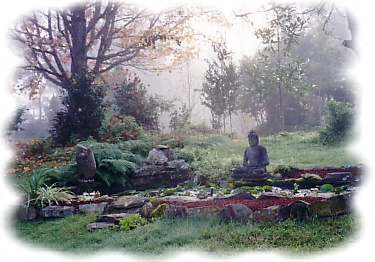
The origin of tea began, it is said, when Daruma, a Buddhist saint, irresponsibly fell asleep over his devotions, and, upon awakening, was so distraught that he cut off his eyelids and threw them to the ground where they took root and grew up as a bush, the leaves of which, when dried and infused in hot water, produced a beverage that would banish sleep.
It would take a lot more than the thought of cut-off eyelids to put me off my first hot cup of tea of the day taken by the window overlooking the river when it is shrouded in early-morning mist. A Chinese watercolour in motion!
Winternights spent in front of the fireplace are the nicest possible thing to do. I can't image that somebody could go through life without ever having roasted chestnuts or prodded glowing coal or made dream pictures in flames or listened to the fire sounds - the crackling and the hissing and the sighing and strange whimpering of a knotted log - or just dozed off in front of a fire.
Winter at "Riverbend" is a time of hibernation, of introspection. Of watching videos, reading books, playing chess - a time for every purpose under heaven, according to Ecclesiastes.

Tuesday, August 11, 2009
Trooper O'Grady's Last Stand
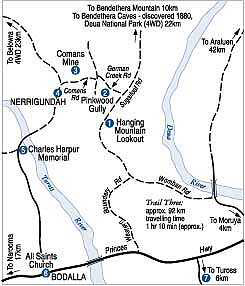 As soon as the weather warms up again, we'll be back on the road exploring the Far South Coast and its vast hinterland. Such as the little town of Bodalla - see map reference 6 - and the even smaller town of Nerrigundah - or rather, what's left of it. The Nerrigundah Mountain Road heads west out of Eurobodalla and becomes unsealed after about 6 km, crossing the picturesque Tuross River at a place which commemorates Charles Harpur, one of Australia's earliest bush poets who had a farm near Nerrigundah in the 1860s - see map reference 5.
As soon as the weather warms up again, we'll be back on the road exploring the Far South Coast and its vast hinterland. Such as the little town of Bodalla - see map reference 6 - and the even smaller town of Nerrigundah - or rather, what's left of it. The Nerrigundah Mountain Road heads west out of Eurobodalla and becomes unsealed after about 6 km, crossing the picturesque Tuross River at a place which commemorates Charles Harpur, one of Australia's earliest bush poets who had a farm near Nerrigundah in the 1860s - see map reference 5.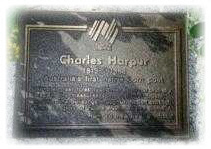 Driving along, you come across something that looks like a caravan park until, on getting closer, you discover that it is a chicken farm whose owner is using half-a-dozen old caravans to house his chickens! It certainly gives a new meaning to the words "Free Range Eggs"!
Driving along, you come across something that looks like a caravan park until, on getting closer, you discover that it is a chicken farm whose owner is using half-a-dozen old caravans to house his chickens! It certainly gives a new meaning to the words "Free Range Eggs"!
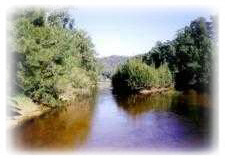 Leaving the pretty river behind, you follow a dry
Leaving the pretty river behind, you follow a dry
and dusty road until you enter the green valley in which Nerrigundah is nestled, surrounded by rugged mountain wilderness. Nerrigundah, an Aboriginal word meaning "Place of Many Berries", is now a peaceful village, and it is difficult to imagine in this tranquillity that once men toiled, sweated and killed here for gold...
After a gold strike at nearby Mt Dromedary in 1860, prospectors found gold at Gulph Creek precipitating a rush at Nerrigundah in 1861. Amenities, and dredges, began to appear and the town was surveyed in 1867. At its height the site was alleged to have 2000 to 3000 inhabitants, including many Chinese, who had at their disposal five hotels and several shops, including one for the Chinese residents, as well as a police station and courthouse. A bit hard to believe today! The mine - see map reference 3 - was opened in the 1880s by EJ Coman and his partner Bloomfield. It operated for a brief but unsuccessful period and by 1889 was left idle and the population began to dwindle.
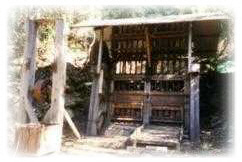 The mine may have been worked periodically since but it wasn't reopened until 1938 by Radiant Mines. It was last worked by Immarna Mines from 1947 to 1950, but there is some anecdotal evidence to suggest that the hunt for gold may have continued through to the 1960s. Today, a walking trail passes by relics of the mine, including the stamper battery used to crush ore and the railway tracks used to move ore from the shafts.
The mine may have been worked periodically since but it wasn't reopened until 1938 by Radiant Mines. It was last worked by Immarna Mines from 1947 to 1950, but there is some anecdotal evidence to suggest that the hunt for gold may have continued through to the 1960s. Today, a walking trail passes by relics of the mine, including the stamper battery used to crush ore and the railway tracks used to move ore from the shafts. 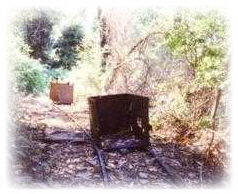
Sawmilling saw a faint revival of the village in the 1950s but little remains today except a few houses and a large monument associated with the Clarke Brothers bushranging gang. On Sunday, April 8, 1866 the gang took over a hut beside Deep Creek, just south of Nerrigundah, and held up the passers-by. Among them was Moruya storekeeper, John Emmott, who was riding home with his dealings. The gang shot his horse from under him, robbed him of the small fortune in his possession, shot him in the thigh and hit him on the head with a pistol. 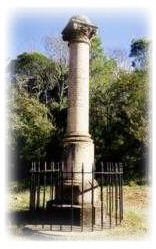 Not satisfied with their gains and perhaps fueled by the ease of their pickings five of the gang rode into Nerrigundah and held up the diggers at the hotel. Two more entered Pollock's Store, now a museum with local information. The owner, one of the main gold purchasers, was forced to furnish the key to his safe. However, while the gang were herding more of victims into the hotel Mrs Pollock snatched the safe key from Thomas Clarke and threw it across the street, where one of her children clinched it between his toes and walked off with it. A candlelight search in the gloam by Clarke proved fruitless.
Not satisfied with their gains and perhaps fueled by the ease of their pickings five of the gang rode into Nerrigundah and held up the diggers at the hotel. Two more entered Pollock's Store, now a museum with local information. The owner, one of the main gold purchasers, was forced to furnish the key to his safe. However, while the gang were herding more of victims into the hotel Mrs Pollock snatched the safe key from Thomas Clarke and threw it across the street, where one of her children clinched it between his toes and walked off with it. A candlelight search in the gloam by Clarke proved fruitless.
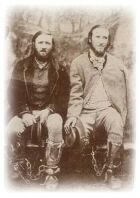 Trooper Miles O'Grady and another trooper entered the hotel just as two of the gang were threatening to kill the local butcher, Robert Drew, who had thrown a roll of notes over their heads behind the bar. O'Grady fired at the two men, narrowly missing Patrick O'Connell but killing William Fletcher, a young jockey and son of a prosperous Batemans Bay farmer, who had only joined the gang the previous day. O'Grady was then shot through the heart in the return fire from William Clarke. The gang then fled town, picked up the other gang members from their base on Deep Creek and journeyed north.
Trooper Miles O'Grady and another trooper entered the hotel just as two of the gang were threatening to kill the local butcher, Robert Drew, who had thrown a roll of notes over their heads behind the bar. O'Grady fired at the two men, narrowly missing Patrick O'Connell but killing William Fletcher, a young jockey and son of a prosperous Batemans Bay farmer, who had only joined the gang the previous day. O'Grady was then shot through the heart in the return fire from William Clarke. The gang then fled town, picked up the other gang members from their base on Deep Creek and journeyed north.
Sergeant Hitch, the officer in charge of the Nerrigundah police returned from Moruya and organised a twelve-man posse. They ambushed the gang at Eucumbene River but no-one was captured, the only victim being a packhorse laden with goods from the store. They were officially declared outlaws the following month.
The monument in town is in honour of O'Grady who was buried in Moruya cemetery. However, it is incorrect that he fought the gang single-handedly as the monument claims. Fletcher's grave, which was allegedly wrapped in bark, was laid and can still be found outside of the Nerrigundah cemetery, about 25 metres from the back right-hand corner. The cemetery itself is behind a grove of wattle trees a hundred metres beyond the monument and slightly to its right.
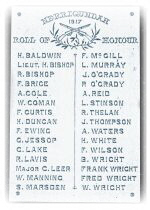 Nerrigundah was still a bustling little town at the outbreak of World War I which many of its men joined up for. A "Roll of Honour" of those fallen in that war lists descendants of the miners and Trooper Miles O'Grady. Today Nerrigundah and the surrounding valley is inhabited by just a handful of people who came in search of some cheap rural acreage and now appreciate being in this very peaceful place - as so aptly described by one of its inhabitants, an Anthony Harris,
Nerrigundah was still a bustling little town at the outbreak of World War I which many of its men joined up for. A "Roll of Honour" of those fallen in that war lists descendants of the miners and Trooper Miles O'Grady. Today Nerrigundah and the surrounding valley is inhabited by just a handful of people who came in search of some cheap rural acreage and now appreciate being in this very peaceful place - as so aptly described by one of its inhabitants, an Anthony Harris, 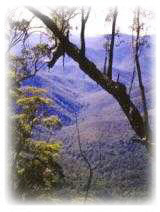 when he writes that "although I travel around Australia, I love to get back, and feel the difference of being in my special place" and about "the soft and vibrant colours of the bush, and the sense of mystery and aliveness it holds."
when he writes that "although I travel around Australia, I love to get back, and feel the difference of being in my special place" and about "the soft and vibrant colours of the bush, and the sense of mystery and aliveness it holds."
All this is just a little more than a hundred kilometres from "Riverbend", and yet there is so much to see and so many new impressions to be gained. It seems to prove what Goethe said in his "Erinnerung":
Warum in die Ferne schweifen, wenn das Gute liegt so nah?
Willst du immer weiter schweifen? Sieh, das Gute liegt so nah.
Lerne nur das Glück ergreifen. Denn das Glück ist immer da.
I seem to remember a saying from my days in Greece, "Nothing worth knowing ever happens beyond the distance of a mule ride." Well, Nerrigundah is just a comfortable mule ride away!












